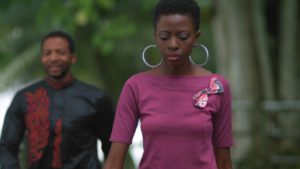FROM CINEMA TELENOVELLA TO CINEMA HAUTE COUTURE
Fantasies of the New Nollywood
By Didi Cheeka
By the time I arrived MUSON Centre’s Agip Hall for the Lights Camera Africa Film Festival, Ema Edosio’s Kasala had been playing for a while and the hall was packed full. Determined to avoid a repeat, I arrived quite early the next day and sat through Granma by Alfie Nze, waiting for Kenneth Gyang’s Lost Café. The festival, as if in defence, have as its guiding principle a statement against perfection. This is not a political stance – à la Garcia Espinosa’s For an Imperfect Cinema. This, rather, seeks to justify the laziness and mediocrity characteristic of filmmaking and festival programming in Nigeria. On the last day of the festival, I sat through, back-to-back, Tunde Kelani’s Sidi Ilujinle – adapted from Wole Soyinka’s play The Lion and the Jewel – and Onyeka Nwelue’s Agwaetiti Obiuto (Island of Happiness).
I find Kelani’s film adaptation of the Nobel laureate’s play a tired, lazy, and uninspired piece of filmmaking. The reason for this laziness is the filmmaker’s sense of entitlement – an attitude characteristic of a certain filmmaking generation; the absence of inspiration arises from an absence of artistic breadth of vision – in the final analysis, Kelani is really just a chronicler of Yoruba tradition and culture using the medium of film; the tiredness comes from really having nothing to say. If, as it seems to me, I’m somewhat harsh on this filmmaker I’d respected so much it comes from a feeling of disappointment – in film after film, Kelani had cheated cinema, had given less than he is capable of. It is either this, or it is that he has nothing to give at all.

In his post-screening comments, Kelani said it was Soyinka who invited him to to adapt the text – there is a sense then in which this adaptation is a bequest. I mean it in the sense that Kelani’s cinema, in becoming more and more theatrical, is stuck in an unconscious struggle to legitimize its birth – it is correct to say, and this is its most damning inheritance, that the cinema of Tunde Kelani is a bastard offspring of the old Yoruba travelling theatre. The illegitimacy is because Kelani is not from the theatre. But, perhaps, I mean kinship beyond an aesthetic sense? It is possible this is quite contrary to his intentions but Kelani’s fidelity to the text, as cultural co-thinker, render him complicit in the patriarchy inherent to the text. The filmmaker’s uncritical treatment of the text presents women as something to be conquered and put in their place – a patriarch’s harem. In Kelani’s film, as in Soyinka’s play, Sidi, the village belle, who consistently rejects the amorous advances of Baroka, the wily village head, to make her the latest wife in his already congested harem is finally conquered by Baroka.
What about Sadiku’s dance around the tree following Baroka’s feigned impotence? Is it the normal practice for wives, in Yorubaland, to celebrate their husband’s impotence with a ritual dance around their effigy, in a village square? I think this is a ridiculous dramatic device on the ‘war of the sexes’ – a war symbolised by an eroticised dance performance of conquest and submission, choreographed by Segun Adefila, celebrating not just the triumph of the strong over the weak and the inevitability and effectiveness of brute force, but, ultimately, Sidi’s enjoyment and complicity in her own forced deflowering. This was the only time, all through the movie, this conquest, submission and acceptance sequence was the only time I sensed unease among the audience – a nervous, unsure atmosphere. The filmmaker, as if anticipating this, keeps the shock of the encounter on an abstract impersonal level. This then is how far back the social consciousness of Kelani’s cinema have been thrown.
Responding to a question, Kelani dismissed any intention to situate his film within a definite mileu. What are we to make of this brusque dismissal? I think this refusal to observe mileu is not innocent of meaning – Kelani wanted to free himself from an honest potrayal of an English-educated village school-teacher of the time. In the play, Soyinka ridicules Lakunle, the village school-teacher as being mentally-enslaved by the non-traditional habits brought by Europeans. Kelani turns Lakunle into a caricature of himself. This is as simple-minded an attack on western culture – in much the same way Kelani’s Thunderbolt was a traditionalist attack on science and the ethics of medicine. In a way, this is wholly in the nature of things. Under the mantel of cultural superiority, the colonialists sought to rob colonized people of their cultural identity. Kelani is trying, using his films, to bend the stick the other way in his mistaken belief that society is fixed for all time, and that its moral, religious and cultural values are immutable.
The surprise is that Kelani feels Soyinka’s invite is for him to film his play rather than make a film of it. As if to compensate for a lack of directorial vision and insight about the human condition, Kelani adopts the posture of a cultural orientation officer and tries to hang on to the coat-tails of tradition which seemed to open the shortest avenue to an ethnic-specific public. The result of this approach to cinema is quite predictable: Sidi Ilujinle brings no new interpretation to Soyinka’s play, offers no fresh insight. Nor does it advance Kelani’s cinema. The other thing to be said is Soyinka’s chronic inabilty to recognize tragedy – Lakunle as a tragic hero ahead of his time, struggling against the cultural practices of a society not ready for his ‘outlandish’ ideas. I find it embarrassing that a man of Soyinka’s intellectual stature could adopt such an anti-intellectual stance towards Lakunle – are we to accept this figure of the playwright’s and villagers’ contempt as symbolic representation of intellectuals out of touch not just with their culture but out of touch with a woman’s nature?

Post-screening interview with Tunde Kelani
This is probably a terrible thing to say about a man of such artistic and intellectual gifts, but I think Soyinka’s treatment of Lakunle, Sidi, and Baroka is reflective of male locker room attitude. What Kelani fails to realize is that the wrestling scene that precedes the rape is a symbolic confrontation. Sadiku’s unintended trickery of getting Sidi to tease Baroka is a plot device to get her into position: in actual fact, we’re being told, her initial no means yes, she really wants it to happen to her, she’s begging for it. What the wrestling and Sidi’s rejection of Lakunle intends is that deep down women enjoy being forced, enjoy being made to submit. Sidi, we’’re being told, is representative of woman nature and Baroka understands what Lakunle does not: women respects only men who master them forcefully – that is the meaning of Baroka’s smug smile in the movie. (Note that Sidi’s anger was not over being forced but in the trickery itself.) This is the meaning of that wrestling encounter that prefigure the rape and why the dice is loaded against Lakunle from the start: violence and love, play and film seeks to prove, are both sides of a coin – the one earns you the right to the other. Kelani’s eroticised dance performance serves the purpose stating explicitly that violence is erotic.
Kenneth Gyang’s Lost Café is symptomatic of what has happened in the past few years: there has appeared a new kind of filmmaker who seem solely interested in the self-congratulatory celebrity culture of cinema. A good number of them possess the proper credential: they have been, in varying degrees, to film schools within and outside the country. But the rest lack experience and display no interest in what has been done in the medium – they are discovering cinema and before them there had been no others. This explains why their films are shallow and narcissistic – a juvenile self-absorption that reached its height in C.J. Fiery Obasi’s O-Town and Nwelue’s Agwaetiti Obiuto with both directors inserting themselves, without logic, in their own films.

You never escape the feeling that the New Nollywood directors don’t seem to know what their films are about, nor interested in the logic of the plot. You suspect that these filmmakers just want to make a movie – whether it all hangs together or not, so long as they get to “tell our story our own way.” In the past, when Nollywood was less sophisticated, filmmakers used to set forth to tell a story. The movies, compared to what we have now, might be bad movies, they might be banal or vulgar, but they told some kind of story and were rarely incoherent. Yes, of course, these old movies were burdened with wooden narratives which, naturally, needed to be broken up – but the makers of these movies struggled with meaning, motive, character. Reacting to this, the makers of the New Nollywood movies eschews the burden of narrative – to overburden themselves with technique. The one is as bad as the other.
What is one to make of Kenneth Gyang’s Lost Café? It is obvious that Gyang considers lack of clarity as complexity, confusion as style – he may even consider a movie as incomprehensible as Nwelue’s Agwaetiti Obiuto complex and stylish precisely for its incoherence. It is obvious this director thinks of his movies as movies of ideas: calling out to the audience, in undramatic transition from scene to scene, “Look how intelligent I am!” and substituting coherent narrative with attempts at calculated responses designed for cheap thrills. This is the attitude of a fanboy – admiring his own pose. I’m not exactly sure, to paraphrase Dylan Thomas, what a movie of ideas look like. I simply want a story to be well told, and this director fails to translate the confused hurt and unrequited love of a betrayed young woman convincingly – how, in the name of God, do you make a love story without love. The directors’ head might be filled with ideas, but what’s happening on the screen?
I trust I won’t be mistaken for the sort of critic who rejects ideas in movies – I simply reject substituting the dramatic and narrative elements of movies with psychological confusion under the bogus label of movies of ideas. I find this movie and this filmmaker intellectually pretentious. (What strikes you, afterwards, is how much Gyang’s titles tend to mirror his films – from the confused narrative of Confusion na Wa to the lost directorial intent of Lost Café.) Perhaps this filmmaker prefer incoherent, meaningless movies so he can feel superior, contemptuous? How, for instance, did Gyang’s heroine, without preparation acquire such detailed knowledge and critique of European film history? How do you explain that embarrassing scene concerning neo-realism and De Sica’s Umberto D – except as a display rack for Gyang’s intelligence.
Briefly on the storyline. Gyang’s heroine had a romantic disappointment, a traumatic injury that changed her completely. As played out on the screen, I don’t believe the love affair possess the capacity to affect her this greatly: neither the romance, nor the trauma convinces. The relationship between heroine and her lover is flat and devoid of desire, they hardly seem to know each other: he is simply a foil for her Norwegian rebound lover with whom there is really no material to explore tension and desire. The whole thing feels so contrived. Gyang seems to have appointed himself Tunde Aladese’s official potraitist – I find her stiff, cold, lacking humour, lacking emotional depth. But, then, there’s no accounting for directorial choice (at least, I hope it’s this, choice, and not plain old lust). In this film, jarringly, shot after shot, scene after scene, Gyang’s heroine brings a blasé more fitting to a street hustler than to the character: Aladese needs a director who is not infatuated with her for firm direction. This is empty filmmaking, without deep feeling or purpose.
What do you make of a movie whose maker is not sure of what it is? Onyeka Nwelue’s Agwaetiti Obiuto is too long and repetitive. In post-screening Q&A via skype, Nwelue affects pompous posture concerning the movie’s larger implications: “I made this film to encourage the young generation to kill off all the old generation.” This from the maker of a movie whose deux es machina is an aged shrine priestess. I doubt if the director or any of his co-workers and actors are quite sure what the movie is about. Agwaetiti is so incoherent were it projected on film a person would be justified in thinking the projectionist had scrambled the reels. You get the feeling this person have not seen many movies, does not really care about movies, is only attracted to movies as Narcissus was to his own image, is not interested in what has been done and what could be done with the medium.
This is not a personal trait: a good number of the New Nollywood fall within this category. It explains why they have such limited approaches to movies, why their movies lack the crude vitality of the old Nollywood movies – I am not, by this, advocating a return to old Nollywood nor a remake of its classics (even though I think a few remakes are not out of place). I’m sure the filmmakers of New Nollywood surprised themselves by how far they get to travel. This, for them, has become a mark of culture: a cultural license to further look down on old Nollywood – their films, relative, technically, to what was, seem competently made. Under the conceited notion of renewing Nollywood, the shallow, narcissistic upstarts of the New Nollywood seek to counter the old plot-driven narrative with purely ‘aesthetic’ works whose main features are pretentiousness and emptiness. Proceeding from a rejection of old Nollywood’s technical incompetence the New preoccupies itself with problems techniques completely detached from narrative and dramatic consideration.
The strangest thing is that this film never fulfils its premise – nor its payoff. Contrary to its title, all through this film, there is no suggestion of happiness – perhaps Nwelue’s conception of happiness is something that comes out of a bottle. From its opening scene – that extended cab ride and the driver’s monologue – this film feels like the kind of story you hear in a cannabis joint: the director seems quite high on …excess. As the film unfolds you know the filmmaker is in trouble: he’s going to prove incapable of handling his material, the spontaneity, euphoria and natural flow of the actors (there’s some good casting and acting here – as if most of the actors are just being their natural self). Like Gyang’s film, Nwelue’s film is not a work of integrity or intelligence. To the extent there’s some honesty in this film it’s in the sex and rape scenes: Nwelue is trying to resolve his conflicts, his obsessions – but in an immature schoolboy way, thoughtless, irresponsibly. I mean it in the sense that both scenes are not needed.

A scene from the film Lost Café.
Asked by a female member about the frivolous handling of an after-rape, Nwelue stunned the audience: “Since I’m not a woman I don’t know how a female rape victim feels, whoever wants to explore that should make her own movie.” (My advice, young man, next time film what you know.) This neat statement – intersectionality in a nutshell – serves to give the impression, when a filmmaker has nothing to express, of not knowing how to express himself due to having so much to express. This is what you get when you’re in a hurry to make movies without taking time to learn how. To reference Pauline Kael, the acceptance of filmmaking as an art form has the dubious advantage of accepting everyone who says he is a filmmaker as a filmmaker. Shocking as the above statement may be – that such a seemingly bright young man could be so obtuse – the last part of it goes to the heart of a recurring challenge thrown at critics: “If you don’t like my film, go and make your own.” I will give the last word to Kael: “You don’t have to lay an egg to know if it tastes good.”




